PATHOPHYSI NR 507
Chamberlain College Of Nursing
Page 2 out of 25 results
Sort by
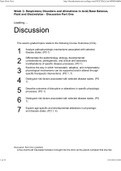
-
Week 2: Respiratory Disorders and Alterations in Acid/Base Balance,Fluid and Electrolytes - Discussion Part One
- Exam (elaborations) • 55 pages • 2022
- Available in package deal
-
- $10.49
- + learn more
A five-month-old Caucasian female is brought into the clinic as the parent complain that she hasWeek 2: Respiratory Disorders and Alterations in Acid/Base Balance,Fluid and Electrolytes - Discussion Part One Loading... This week's graded topics relate to the following Course Outcomes (COs). Analyze pathophysiologic mechanisms associated with selecteddisease states. (PO 1) Differentiate the epidemiology, etiology, developmental considerations, pathogenesis, and clinical and laboratory mani...
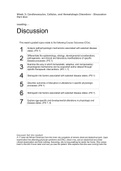
-
PATHOPHYSI NR 507 Week 3: Cardiovascular, Cellular, and Hematologic Disorders - Discussion Part One
- Exam (elaborations) • 41 pages • 2022
- Available in package deal
-
- $10.49
- + learn more
A 17-year-old African American from the inner city complains of severe chest and abdominal pain. Upon examination the attending physician performs and EKG, chest x-ray, and an abdominal and chest clinical examination and finds nothing. Assuming, she is drug seeking he sends her home. She comes back to the ER 4 hours later and now you see the patient. She explains that she was running track this
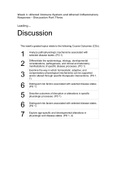
-
PATHOPHYSI NR 507>Week 1: Altered Immune System and Altered Inflammatory Response - Discussion Part Three
- Exam (elaborations) • 30 pages • 2022
- Available in package deal
-
- $9.49
- + learn more
A 44-year-old patient presents with lump in the chest of approximately 2 cm in diameter. There is a slight dimple over the location of the lump and when the lump is manipulated it seems to be attached to the surrounding tissue. A lumpectomy is performed and the mass is sent to pathology. The pathology report comes back and the mass is confirmed to be an estrogen receptor negative, a progesterone receptor negative and a her2/neu receptor positive breast cancer. What are some of the risk fac...
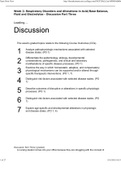
-
PATHOPHYSI NR 507 Week 2: Respiratory Disorders and Alterations in Acid/Base Balance,Fluid and Electrolytes - Discussion Part Three
- Exam (elaborations) • 27 pages • 2022
- Available in package deal
-
- $10.49
- + learn more
his week's graded topics relate to the following Course Outcomes (COs). Analyze pathophysiologic mechanisms associated with selecteddisease states. (PO 1) Differentiate the epidemiology, etiology, developmental considerations, pathogenesis, and clinical and laboratory manifestations of specific disease processes. (PO 1) Examine the way in which homeostatic, adaptive, and compensatoryphysiological mechanisms can be supported and/or altered throughspecific therapeutic interventions. (PO 1, 7...
PATHOPHYSI NR 507, Showing 1 ,2,3,4,5,6,7,8 STUDY PACKAGE BUNDLE (A+)
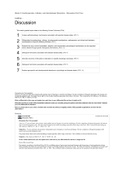
-
Week 2: Respiratory Disorders and Alterations in Acid/Base Balance,Fluid and Electrolytes - Discussion Part One
- Exam (elaborations) • 22 pages • 2022
- Available in package deal
-
- $10.49
- + learn more
This week's graded topics relate to the following Course Outcomes (COs). Analyze pathophysiologic mechanisms associated with selecteddisease states. (PO 1) Differentiate the epidemiology, etiology, developmental considerations, pathogenesis, and clinical and laboratory manifestations of specific disease processes. (PO 1) Examine the way in which homeostatic, adaptive, and compensatoryphysiological mechanisms can be supported and/or altered throughspecific therapeutic interventions. (PO 1, ...
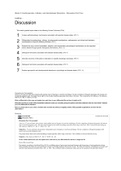
-
PATHOPHYSI NR 507 Week 3: Cardiovascular, Cellular, and Hematologic Disorders - Discussion Part Two
- Exam (elaborations) • 22 pages • 2022
- Available in package deal
-
- $10.49
- + learn more
Week 3: Cardiovascular, Cellular, and Hematologic Disorders - Discussion Part Two Loading... This week's graded topics relate to the following Course Outcomes (COs). 1 Analyze pathophysiologic mechanisms associated with selected disease states. (PO 1) 2 Differentiate the epidemiology, etiology, developmental considerations, pathogenesis, and clinical and laboratory manifestations of specific disease processes. (PO 1) 3 Examine the way in which homeostatic, adaptive, and compensatory phy...
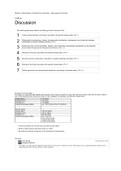
-
PATHOPHYSI NR 507 Week 5: Alterations in Endocrine Function - Discussion Part One
- Exam (elaborations) • 19 pages • 2022
- Available in package deal
-
- $9.49
- + learn more
This week's graded topics relate to the following Course Outcomes (COs). 1 Analyze pathophysiologic mechanisms associated with selected disease states. (PO 1) 2 Differentiate the epidemiology, etiology, developmental considerations, pathogenesis, and clinical and laboratory manifestations of specific disease processes. (PO 1) 3 Examine the way in which homeostatic, adaptive, and compensatory physiological mechanisms can be supported and/or altered through specific therapeutic interventio...
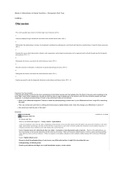
-
Week 4: Alterations in Renal Function - Discussion Part Two
- Exam (elaborations) • 19 pages • 2022
- Available in package deal
-
- $10.49
- + learn more
Week 4: Alterations in Renal Function - Discussion Part Two Loading... Discussion This week's graded topics relate to the following Course Outcomes (COs). 1 Analyze pathophysiologic mechanisms associated with selected disease states. (PO 1) 2 Differentiate the epidemiology, etiology, developmental considerations, pathogenesis, and clinical and laboratory manifestations of specific disease processes. (PO 1) 3 Examine the way in which homeostatic, adaptive, and compensatory physiologica...
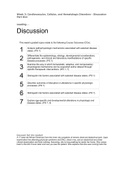
-
Week 3: Cardiovascular, Cellular, and Hematologic Disorders - Discussion Part One
- Exam (elaborations) • 41 pages • 2022
- Available in package deal
-
- $10.49
- + learn more
This week's graded topics relate to the following Course Outcomes (COs). 1 Analyze pathophysiologic mechanisms associated with selected disease states. (PO 1) 2 Differentiate the epidemiology, etiology, developmental considerations, pathogenesis, and clinical and laboratory manifestations of specific disease processes. (PO 1) 3 Examine the way in which homeostatic, adaptive, and compensatory physiological mechanisms can be supported and/or altered through specific therapeutic interve...

$6.50 for your textbook summary multiplied by 100 fellow students... Do the math: that's a lot of money! Don't be a thief of your own wallet and start uploading yours now. Discover all about earning on Stuvia


